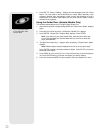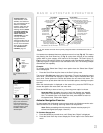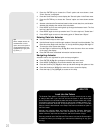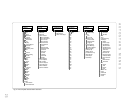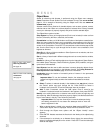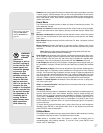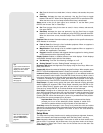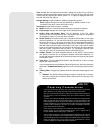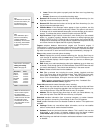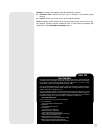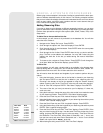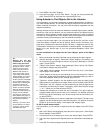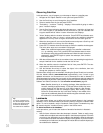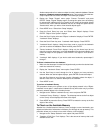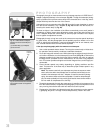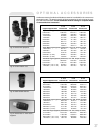
30
b. Lunar: Choose this option to properly track the Moon over long observing
sessions.
c. Custom: Allows entry of user-defined tracking rates.
■ Reverse L/R: Reverses the functions of the Left and Right Arrow keys (i.e., the
Right key moves the telescope to the left).
■ Reverse U/D: Reverses the functions of the Up and Down Arrow keys (i.e., the
Up key moves the telescope down).
■ Calibrate Motor: If the telescope motors appear to have a problem, use this
option to retest the motors before performing a Reset. This option is also used if
an Autostar unit is moved between telescopes, to match Autostar to the new tel-
escope. To calibrate the motors, select this option and press ENTER.
■ High Precision: If High Precision is turned on, when looking for a faint celestial
object (i.e., a nebula or galaxy), Autostar first slews to a nearby bright star and
displays "ENTER to Sync." Center the star in the eyepiece, then press ENTER.
At that point the telescope has a high precision alignment to that part of the sky
and it then slews to the object that was originally requested.
Targets switches between Astronomical targets and Terrestrial targets. If
"Astronomical" is selected, the telescope tracking motor is activated and any object
you observe will remain centered in the eyepiece. If "Terrestrial" is selected, the track-
ing motor is turned off. To learn how to track an object automatically, see page 18.
Site provides access to several options including:
■ Select: Displays the currently selected observing site. Use the Scroll keys to
cycle through all available sites (see
ADD below). Press ENTER when the site
you wish to select displays. Use this option when you move to a different geo-
graphic location.
■ Add: Allows you to add new observing sites to the database (up to six sites may
be stored). Scroll through the list of Countries/States. Press ENTER when the site
you wish to add displays. Then choose the desired city in the same manner.
■ Delete: Deletes a stored site from the database.
■ Edit: Edits a selected site, including: the name, latitude, longitude, and time
zone. Time Zone refers to the Greenwich Mean Time (GMT) time zone shift.
Users West of Greenwich, England use “-” hours, East of Greenwich use “+”
hours. For the United States, look up the time zone shift in Table 1.
Note: Autostar compensates for daylight savings time, if selected. See
SETUP MENU: DAYLIGHT SAVING, page 29.
Owner Info accesses the owner information menu, including:
■ Name: Users may enter both their first and last names using the Up and Down
Arrow keys to cycle through the alphabet. Use the Right and Left Arrow keys to
move through the text. Press ENTER when the entry is complete.
■ Address: Use the Up and Down Arrow keys to enter your street address, city,
state, and zip code. Press ENTER when the entry is complete.
Download transfers information from a personal computer or another Autostar.
During the operation, the warning “Downloading Do Not Turn Off” appears.
Clone uploads information from one Autostar handbox to another. Three options are
available:
■ Catalogs: Sends only user-defined object information, such as new satellite
orbits or comet data to another Autostar handbox.
■ Software: Sends only the basic Autostar software. This is useful if one user has
downloaded a new version of Autostar software from the Meade website
(www.meade.com) and wants to pass this software along to friends.
■ All: Everything–user-defined information and Autostar software–is sent to anoth-
er Autostar.
Time Zone Shift
Atlantic -4 Hours
Eastern -5 Hours
Central -6 Hours
Mountain -7 Hours
Pacific -8 Hours
Alaska -9 Hours
Hawaii -10 Hours
Table 1: Time Zone Shift.
Note: The Download and
Clone functions require
the optional #505
Astrofinder Software and
Cable Connector Kit. See
the instruction sheet
included with the kit for
more information on how
to download.
Tip:
If the "ENTER to Sync"
feature is accessed by
mistake (holding the
ENTER key for more than
2 seconds), press MODE
to return to the previous
screen.
Want to learn more about
adding and editing
sites? See page 32.
Tip:
The Reverse L/R and U/D
functions are useful if you
are observing in the
Southern hemisphere.



